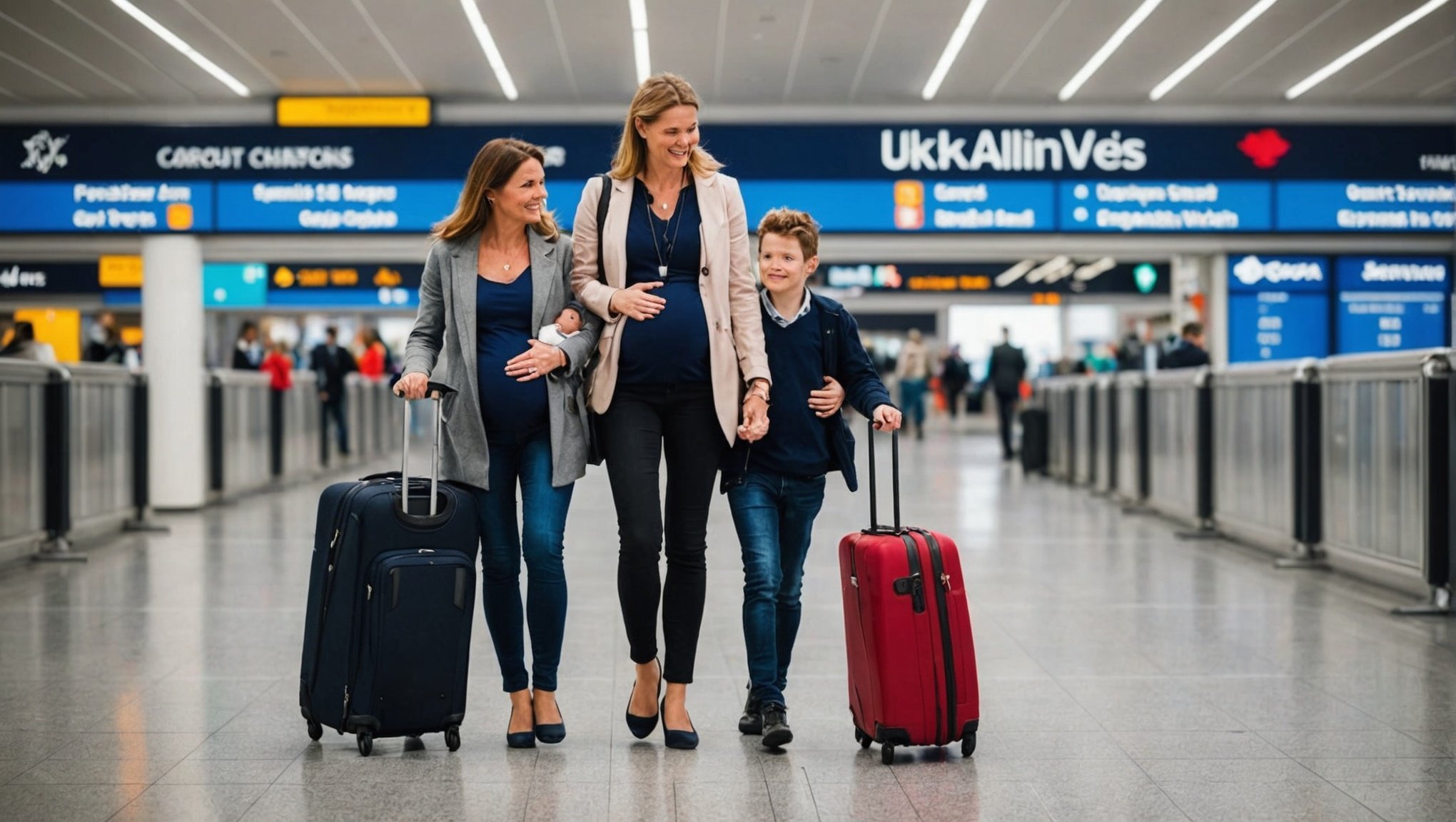Air travel during pregnancy can be daunting. Expecting mothers face unique challenges, but with the right preparation, flying can be manageable and enjoyable. UK airlines offer specific guidelines and support to help ease the journey. From understanding policies on travel restrictions to tips on comfort during the flight, this guide is designed to empower you. Discover essential insights to ensure a smooth travel experience for both you and your little one.
Booking Flights with UK Airlines
When planning air travel as an expecting mother, several factors should be considered to ensure a comfortable journey. Flight Booking Tips include checking the airline's pregnancy policies prior to purchase. This ensures compliance with any restrictions or required documentation.
In parallel : Essential Guidelines for Tracking Iron Levels in Expecting Mothers at UK Hospitals: A Comprehensive Overview
UK Airlines such as British Airways and EasyJet offer favorable pregnancy policies. British Airways allows travel up to the end of the 36th week for single pregnancies, while EasyJet permits travel until the 35th week. Always verify specific requirements, as some airlines may request a medical certificate after a certain stage of pregnancy.
Timing your flight is crucial for comfort and safety. The second trimester is often recommended as the best time for pregnant travelers to fly, due to reduced risks and increased energy levels. Consider booking flights during less crowded times to avoid stress and ensure a more relaxed experience.
This might interest you : Unlocking the Secrets: Key Criteria for Diagnosing Gestational Hypertension in the UK
Bulleted List:
- Check airline's pregnancy policies before booking
- Consider airlines with favorable policies like British Airways and EasyJet
- Aim to travel during the second trimester
- Choose flights during less busy periods
These flight booking tips can help ensure a safer and more pleasant journey for expecting mothers traveling with UK Airlines.
Medical Preparations Before Travel
Understanding the necessary medical preparations before traveling is crucial for expecting mothers. It ensures a safe and comfortable journey.
Consultation with Healthcare Provider
Before booking a flight, it's essential to have a thorough discussion with a healthcare provider. This consultation will help assess any potential risks and provide personalized medical advice. Your doctor can offer guidance on managing pregnancy symptoms during travel and advise on whether flying is safe for your specific condition.
Vaccinations and Medical Checks
Pregnant travelers should ensure they are up-to-date with necessary vaccinations. Some vaccines are recommended or required depending on the destination. Additionally, routine medical checks can identify any health concerns that might affect travel plans. These checks are vital in maintaining both maternal and fetal health during the journey.
Fit-to-Fly Letter and Documentation
Obtaining a fit-to-fly letter from your healthcare provider is often a requirement for pregnant travelers. This document verifies that you are medically cleared to fly and can be requested by airlines. Understanding the required medical documentation ensures compliance with airline policies and prevents any last-minute travel disruptions.
- Consult a healthcare provider for personalized advice
- Ensure necessary vaccinations are up-to-date
- Obtain a fit-to-fly letter for airline requirements
These steps are integral to a stress-free and healthy travel experience.
Airline Policies on Pregnancy
Navigating airline policies for pregnant travelers can be challenging but essential for a safe journey.
Overview of Policies
Airline policies regarding pregnancy often vary, but common regulations exist to ensure safety. Most airlines allow travel until the end of the second trimester, with restrictions tightening as the pregnancy progresses. Understanding these travel guidelines is crucial for planning.
UK Airlines Regulations
Major UK airlines, like British Airways and EasyJet, have specific pregnancy regulations. For instance, British Airways permits travel up to the 36th week of a single pregnancy, while EasyJet allows until the 35th week. These travel guidelines emphasize the importance of checking individual airline policies for any required documentation or pregnancy regulations.
Implications for Different Stages
The implications of these airline policies vary across different pregnancy stages. Early in pregnancy, travel is generally unrestricted. However, as the due date approaches, airlines may require a medical certificate or fit-to-fly letter. These pregnancy regulations ensure both the safety of the mother and the unborn child.
Bulleted List:
- Verify specific airline pregnancy regulations
- Understand travel guidelines for different pregnancy stages
- Prepare necessary documentation for later stages
By adhering to these airline policies, pregnant travelers can ensure a smooth and stress-free experience.
In-Flight Comfort and Safety
Ensuring in-flight comfort and safety is paramount for pregnant travelers. Adhering to specific safety tips can significantly enhance the travel experience.
Tips for Enhancing Comfort
Selecting the right seat can greatly improve in-flight comfort. Opt for an aisle seat to facilitate easier movement and access to the restroom. Pregnant travelers should prioritize legroom, so choosing a seat with extra space or near the bulkhead can be beneficial. Wearing loose, breathable clothing and using a lumbar pillow can also enhance comfort.
Safety Measures to Follow
Safety tips for pregnant travelers include staying hydrated and avoiding caffeine and alcohol. Regularly stretching and walking around the cabin helps prevent deep vein thrombosis (DVT). Wearing compression stockings can further reduce this risk. Always keep a seatbelt fastened under the abdomen for safety.
Recommended Seating Arrangements
Pregnant travelers should consider the following seating arrangements for optimal in-flight comfort:
- Aisle seats for easy movement
- Bulkhead seats for extra legroom
- Seats near the front for quicker boarding and deplaning
These safety tips and seating strategies provide pregnant travelers with practical solutions for a more comfortable and secure journey. Prioritizing these measures ensures a pleasant flight experience.
Dealing with Potential Complications
Awareness and preparedness are key for a safe journey.
Common Pregnancy Complications
During air travel, pregnant travelers should be aware of potential pregnancy complications. Issues such as nausea, dizziness, or swelling can occur. It's crucial to monitor symptoms and seek assistance if necessary. Knowing the signs of more serious complications, like preterm labor or high blood pressure, can ensure timely intervention.
Emergency Procedures and Protocols
Airlines have specific emergency procedures in place for pregnant travelers. Cabin crew are trained to handle medical situations, providing basic in-flight care if needed. It's advisable to inform the crew of your pregnancy at the start of the flight. This ensures they are prepared to assist with any emergency procedures should complications arise.
Managing Discomfort On Board
To manage discomfort or minor complications on board, pregnant travelers can follow these best practices:
- Stay hydrated and move regularly to improve circulation.
- Use a travel pillow for better support.
- Wear loose clothing to reduce swelling.
Pregnancy complications can be daunting, but being informed and prepared can make a significant difference. By understanding emergency procedures and focusing on in-flight care, pregnant travelers can navigate potential challenges with confidence.
Packing Essentials for Pregnant Travelers
Ensure a comfortable and stress-free journey with the right travel essentials.
Comprehensive Packing List
Creating a packing checklist is crucial for expecting mothers. It ensures all necessary travel essentials are included. Begin with pregnancy needs such as prenatal vitamins, a small first-aid kit, and comfortable clothing. Don’t forget important documents like your medical records and fit-to-fly letter. These items are vital for both health and convenience.
Essential Items for Comfort and Health
For maximum comfort, consider packing a lumbar pillow and compression stockings. These items can help alleviate discomfort during travel. Snacks and a refillable water bottle are also essential to maintain hydration and energy levels. As one traveler noted, "Having my own snacks and a water bottle made all the difference during my flight."
Tips on Managing Luggage and Carry-Ons
Managing luggage efficiently is important. Use a lightweight suitcase with wheels to reduce strain. Pack heavier items at the bottom to maintain balance. For carry-ons, choose a backpack or crossbody bag to keep hands free. This allows easy access to travel essentials like snacks and documents.
- Packing checklist: prenatal vitamins, medical records
- Pregnancy needs: lumbar pillow, compression stockings
- Travel essentials: snacks, water bottle
By following this packing checklist, pregnant travelers can ensure a more comfortable and prepared journey.
Resources and Support for Expecting Mothers
Valuable insights and assistance for a smooth journey.
Recommended Resources for Further Information
Expecting mothers can greatly benefit from a variety of support resources. These include pregnancy-specific travel guides and health advisories. Expert pregnancy advice from healthcare providers is crucial for personalized guidance. Additionally, many airlines offer travel assistance programs, providing essential information on safe travel during pregnancy.
Online Communities and Forums
Online communities are invaluable for sharing experiences and gathering pregnancy advice. Platforms such as BabyCenter and What to Expect host forums where mothers exchange tips and support. Engaging in these support resources helps expectant travelers feel connected and informed. One member shared, "The community's tips on safe travel during pregnancy were a lifesaver."
Expert Recommendations for Safe Travel
Experts recommend several strategies to ensure safe travel during pregnancy. Consulting with a healthcare provider before travel is essential. They can provide pregnancy advice tailored to individual needs. Additionally, utilizing travel assistance services offered by airlines can enhance safety and comfort.
- Support resources: travel guides, health advisories
- Travel assistance: airline programs, expert guidance
- Pregnancy advice: healthcare consultations, online forums
By leveraging these support resources, expecting mothers can navigate their travel plans with confidence and ease.











